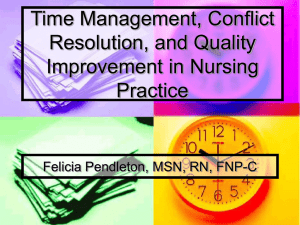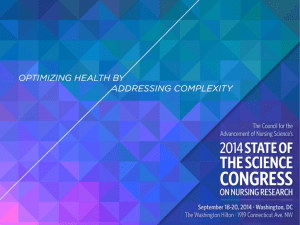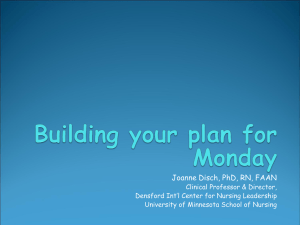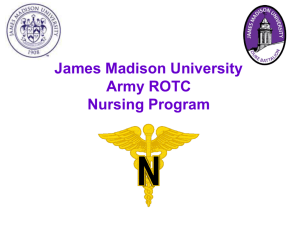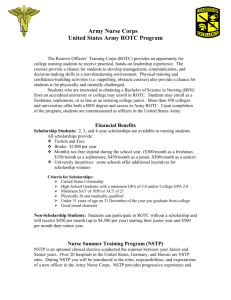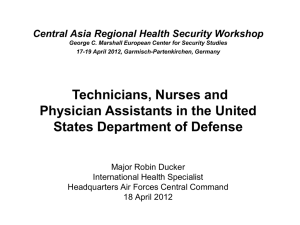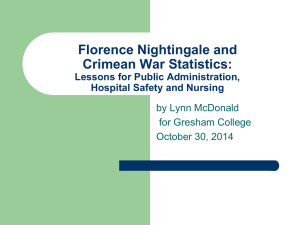officer professional development - American Academy of Ambulatory
advertisement
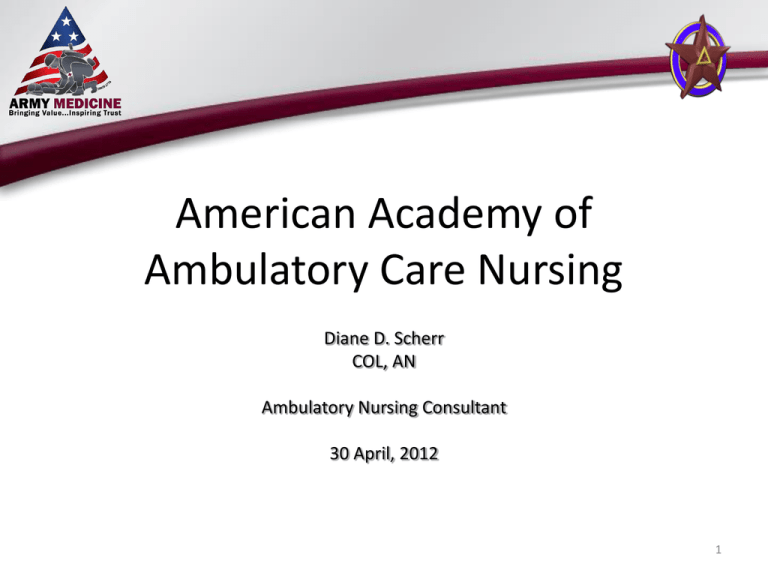
American Academy of Ambulatory Care Nursing Diane D. Scherr COL, AN Ambulatory Nursing Consultant 30 April, 2012 1 Research: Provides organizational traction and momentum To sustain our Army Nurse Corps we must maintain the quality and viability of the AllVolunteer Force. ANC STRATEGIC LOA: Leader Development Warrior Care Evidence Based Care Human Capital To prepare our Army Nurse Corps we must maintain a high level of readiness for the current operational environments. To reset our Army Nurse Corps we must prepare our Army Nurses for future deployments and other contingencies. To transform our Army Nurse Corps, we must continuously improve our ability to meet the needs of future operations. Strategic Communication: Create and distribute “Public Diplomacy”; getting the right message, through the right media, to the right audience at the right time and with the right effect Leadership: A persistent, sustainable nurse leader succession plan created fullspectrum leaders; who were adaptive to any conditionsbased mission, provided a persuasive voice at key echelons of influence in the AMEDD, and innovated doctrine to blueprint the future of the ANC. Warrior Care: Optimized nursing care delivery systems wrapped nursing capability around AMEDD strategic goals and missions; Warrior/patient/familycentered care models embraced evidence-based practice to achieve best patient outcomes. Evidence-Based Care: Evidence-based methodology optimized business practices and cost-capabilities by blending analysis, measuring, and re-designing into daily performance. Human Capital: The ANC footprint is optimized through validation of priorities and the force structure is re-postured for conditions-based capability and capacity END STATE: An organization that consistently achieved performance excellence, fostered innovation, SUSTAIN PREPARE RESET TRANSFORM built knowledge and capabilities, and insured organizational credibility and sustainability 2 Patient CareTouch System Peer Feedback Care Teams Core Values Standardized Documentation Enhanced Communication Talent Management Skill Building Capability Building Patient Advocacy Leader Development Optimized Performance Army Nursing Team Creed I am a member of the Army Nursing Team My patients depend on me and trust me to provide compassionate and proficient care always. I nurture the most helpless and vulnerable and offer courage and hope to those in despair. I protect the dignity of every individual put in my charge. I tend to the physical and psychological wounds of our Warriors and support the health, safety, and welfare of every retired Veteran. I am an advocate for family members who support and sustain their Soldier during times of War. It is a privilege to care for each of these individuals and I will always strive to be attentive and respectful of their needs and honor their uniquely divine human spirit. Healthy Work Environments EvidenceBased We are the Army Nursing Team We honor our professional practice standards and live the Soldier values. We believe strength and resiliency in difficult times is the cornerstone of Army Nursing. We embrace the diversity of our team and implicitly understand that we must maintain a unified, authentically positive culture and support each other’s physical, social, and environmental well-being. We have a collective responsibility to mentor and foster the professional growth of our newest Team members so they may mentor those who follow. We remember those nursing professionals who came before us and honor their legacy, determination, and sacrifice. We are fundamentally committed to provide exceptional care to past, present, and future generations who bravely defend and protect our Nation. The Army Nursing Team: caring, strong, and always ready Authored by LTC Leigh McGraw Shared Accountability Centers for Nursing Science and Clinical Inquiry 3 Patient Centered Medical Home Model Implementation • History of PCMH • CBPCC Progress • Primary Care and PCMH “transition” • Challenges • Trends • Solutions • Way ahead 4 Patient Centered Medical Home Model Implementation Challenges • Training • Leadership Roles for Army Nurses • Leadership • Certification • Model Implementation and Expert Support • Standardization for Nursing Care and Training 5 Patient Centered Medical Home Model Implementation • Way ahead PCMH CBPCC Soldier PCMH Standards Ambulatory Nursing Role- Near and Far Future 6 They are all Entrusted to our Care



